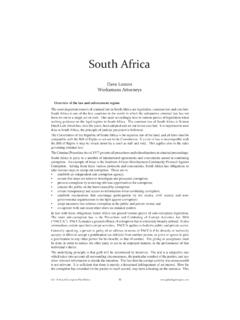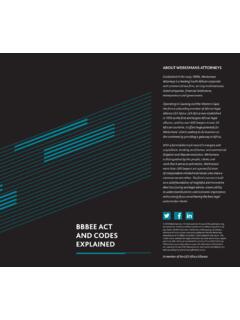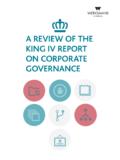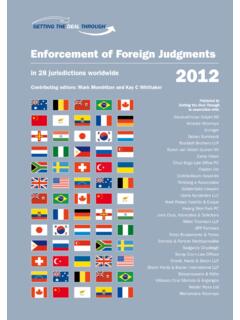Transcription of Companies Act No. 71 of 2008 Duties ... - Werksmans …
1 Companies Act No. 71 of 2008 Duties and liabilities of Directors A Guide to business Rescue prepared by Werksmans AttorneysCompanies Act No. 71 of 2008 Duties and liabilities of Directors This booklet provides insight into certain of the responsibilities and Duties of the board of directors of South African Companies as set out in the new Companies Act No. 71 of 2008 (the Act). The following topics are covered: scope of directors Duties ; potential liability and relevant penalties for breach of law and/or directors Duties ; limitation and/or indemnification against directors liability; appointment and removal of directors of a company; restrictions imposed on who may become a director; and quorum for a meeting of a company s board of Act was signed into law on 8 April 2009 and become operative from 1 May 66 of the Act provides that the business and affairs of a company must be managed by or under the direction of its board of directors, which has the authority to exercise all of the powers and perform all of the functions of the company, except to the extent that the Act or the company s Memorandum of Incorporation (MOI) provide 66 of the Act further stipulates that.
2 The board of a private or personal liability company must comprise of at least one director, in addition to the minimum number of directors that the company must have to satisfy any requirement to appoint an audit committee, or a social and ethics committee; the board of a public or non-profit company must comprise of at least three directors, in addition to the minimum number of directors that the company must have to satisfy any requirement to appoint an audit committee, or a social and ethics committee; and the company s MOI may specify a higher minimum number of terms of the Act, a company s MOI may: specifically authorise one or more named persons to appoint and remove one or more directors; provide for one or more persons to be ex officio directors of the company; and provide for the appointment or election of one or more persons as alternate directors of the company.
3 Duties and liabilities of Directors prepared by Werksmans AttorneysImportantly, in the case of a profit company (other than a state owned company), the MOI must provide for the election by shareholders of at least 50% of the directors and 50% of any alternate to the extent that the MOI of a company provides otherwise, the company may pay remuneration to its directors for their services, but such remuneration may only be paid in accordance with a special resolution approved by the shareholders within the previous two years. Directors dutiesPrior to the introduction of the Act, the Duties of company directors were governed by South African common law. This dictates that directors act in the utmost good faith and in the best interests of their Companies and includes the need to exercise care, skill and diligence so as to promote company success through independent to properly perform the common law Duties may render a director personally liable to pay monetary Act now codifies the common law position and makes a few notable additions (which do not alter the common law position significantly).
4 The Act extends the Duties of directors and increases the accountability of directors to the shareholders of the 76 of the Act addresses the standard of conduct expected from directors and extends it beyond the common law duty of directors by compelling them to act honestly, in good faith and in a manner they reasonably believe to be in the best interests of, and for the benefit of, their Companies . Section 76(3) of the Act states that a director of a company, when acting in that capacity, must exercise the powers and perform the functions of a director: in good faith and for a proper purpose; in the best interests of the company; and with the degree of care, skill and diligence that may reasonably be expected of a person carrying out the same functions in relation to the company as carried out by that director, and having the general knowledge, skill and experience of that 76(4) of the Act states that in respect of any matter arising in the exercise of the powers or the performance of the functions of a director, a director will have satisfied the obligations in section 76(3) of the Act, if the director: has taken reasonably diligent steps to become informed about the matter; has made a decision, or supported the decision of a committee or the board with regard to that matter.
5 And had a rational basis for believing, and did believe, that the decision was in the best interests of the company. In further compliance with this section, the director is required to communicate to the board, at the earliest practicable opportunity, any material information that comes to his or her attention, unless he or she: reasonably believes that the information is publicly available or known to the other directors; or is bound by a legal or ethical obligation of 72 of the Act entitles Companies to appoint board committees and delegate to any committee any authority of the board. Such committees may include people who are not directors of the company, but they may not be ineligible or disqualified to be a company director and may not vote on any matter to be decided by the committee.
6 Board committees have the full authority of the board in respect of matters referred to them and may consult with or receive advice from any person. However, the creation of any committee and the delegation of any power do not by themselves satisfy or constitute compliance by a director with his or her Duties as a director. Directors liabilitySection 77 of the Act prescribes certain statutory liabilities , which are placed on the directors of a company. In terms of section 77(2)(a) of the Act, a director of a company may be held liable (in accordance with the principles of the common law relating to the breach of a fiduciary duty) for any loss, damages or costs sustained by the company as a consequence of any breach by the director of the Duties contemplated, inter alia, in section 76 of the action taken that directly or indirectly purports to relieve a director of liability is considered void.
7 A director of a company will, in addition, be held liable where that director: purports to bind the company or authorise the taking of any action by or on behalf of the company without the requisite authority; acts in the name of the company in a way that is false or misleading; or knowingly or recklessly signs or consents to the publication of a financial statement which is false or misleading. Such a director is held personally liable to the company and to any other affected person for any consequential loss suffered by the company or such person. The liability of a director is, in terms of section 77(6) of the Act, joint and several with any other person who is or may be held liable for the same act (which means that a single director can be held liable for the totality of damages suffered by a third party as a result of the breach of fiduciary Duties ).
8 Duties and liabilities of Directors prepared by Werksmans AttorneysProceedings to recover any loss, damages or costs for which a person is or may be held liable in terms of section 77 of the Act may not be commenced more than three years after the act or omission that gave rise to that Act further provides for the liability of directors, where they trade recklessly or conduct the company s business with the intention of defrauding a creditor. Sub-sections 77(3)(b) and (c) of the Act state that any director of a company is liable for any loss, damages or costs sustained by the company as a direct or indirect consequence of the director: having acquiesced in the carrying on of the company s business despite knowing that it was being conducted in a manner prohibited by section 22(1) of the Act; or being party to an act or omission by the company despite knowing that the act or omission was calculated to defraud a creditor, employee or shareholder of the company or had another fraudulent purpose.
9 Section 22(1) of the Act states that a company must not carry on its business recklessly, with gross negligence, with intent to defraud any person or for any fraudulent purpose. Therefore, if a company continues to incur debts, where, in the opinion of reasonable businessmen standing in the shoes of the directors, there would be no reasonable prospect of the creditors receiving payment when due ( commercial insolvency), it will in general be a proper inference that the company s business is being carried on recklessly or negligently as contemplated by section 22(1) of the test will always be that there will come a point in time when reasonable businessmen would wind up the company and pay creditors in full, unless they have access to further capital which can revitalise the company with some appropriate form of capital reconstruction.
10 The detail of financial information available to a director, together with the veracity of such information, will be taken into account when the personal liability of such director is examined in terms of section 77 of the is also important to note that where a company is considered to be financially distressed (in that it appears that within the immediately ensuing six months it is either reasonably unlikely that the company will be able to pay all of its debts as they become due and payable, or that it is reasonably likely that the company will become insolvent - whether as a result of the business of the company being carried on recklessly or otherwise) and as a result, business rescue proceedings have commenced, the Act, in section 142, imposes additional responsibilities on company directors.







